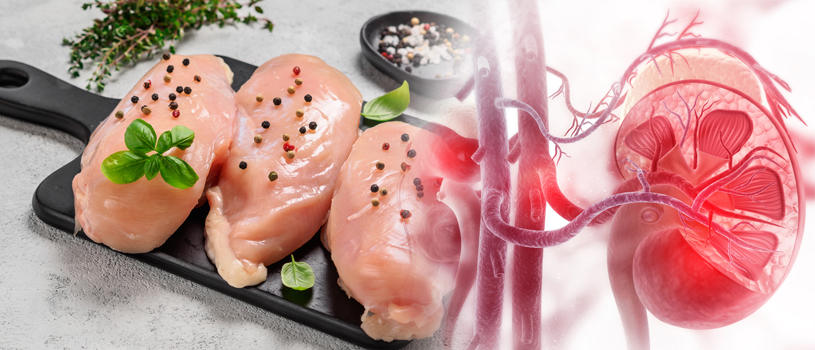In stage 3 kidney disease, the kidneys still function to remove fluid, potassium, phosphorus, and protein waste from the blood. So, you can have a diet that is moderate in protein, potassium, and phosphorus to let the body function properly. In order to slow down the progression of CKD, a kidney patient has to adhere to the dietary restrictions suggested by the dietician.
When it comes to kidney disease, patients always seek dietician advice whether they can have skinless and boneless chicken during stage 3 kidney disease. To those patients, here is what you should know about chicken consumption during stage 3 of CKD.
Skinless and boneless chicken most commonly consumed chicken parts are not rich in fat, sodium, phosphorus, and potassium like skin-on chicken. A 3-ounce piece of cooked, boneless, and skinless chicken breast contains approximately 220 mg of potassium and:
- 63 mg sodium
- 192 mg phosphorus
Skinless chicken cannot be included amongst the rich sources of potassium since it provides less than 10% of the recommended dietary allowance of the mineral in every portion. So, a kidney patient in the stage3 of CKD is allowed to consume boneless and skinless chicken only in a limited portion.
To get started with your diet, check with these nutritional goals when you have stage 3:
Count your calories: Having enough calories in your meal can prevent weight loss or add extra calories if you are obese or underweight accordingly. Ask your dietician about the right calories you need and monitor your progress.
Eat the right kinds of fats: If your cholesterol level is high, unhealthy fats like Trans fats, it should be replaced by monounsaturated fats like vegetable oil, olive oil, and canola oil but only 2 or 3 three spoons in a day. Also, your dietician would recommend you limit foods with high cholesterol.
Fluid: The fluid is restricted in stage 3 of CKD because the kidneys cannot remove too much fluid from the body. Sudden weight gain, panting, swelling are some of the signs you may notice when the body starts to retain fluid. These symptoms may indicate that your kidney function is not appropriate and your body is not excreting fluid in the form of the urine.
Phosphorus: To prevent phosphorus from building in the blood, you are required to make certain changes in your diet.
Limit foods that are high in phosphate or phosphate additives such as organ meats, whole-grain bread, cola, liver, dairy products, chocolate, peanut butter, etc.
Potassium: Until your potassium levels are high, your dietician would suggest consuming potassium in moderation. To reduce your potassium level, limit high-potassium foods such as avocado, bananas, honeydew, legumes, nuts, potatoes, seeds, tomatoes, and yogurt.
Protein: During stage 3 kidney disease, kidney function reduces to an extent and you are required to limit protein in your diet. People on a vegan and vegetarian diet may not have any difficulty in meeting protein restriction, but closely monitor their phosphorus intake as dairy products which are protein and calcium sufficient are rich in phosphorus component.
Sodium: Sodium is also restricted during stage 3. Too much sodium in your diet allows fluid to retain in the cells and tissues. Having too much fluid in your diet raises blood pressure adversely which eventually hurt your kidneys. Even when you are preparing chicken, avoid using salt or other salt substitutes to ensure your share of sodium in a diet is not too much.
The Takeaway
When you have stage 3 CKD, consulting a dietician is crucial to know which foods are healthy and which are not. Adhering to the guidelines by your dietician will help maintain the quality of life and slow down the progression of kidney disease.
To get assistance from our dietician, book your appointment now!


I have stage 3 CKD. I need dietary advice from a dietitian please.
Dave Smith
Thank you, Dave Smith, for showing your belief in Ayurveda. CKD stage 3 is a severe condition, which means you are very near to kidney failure. To rejuvenate your diseased kidney, try to avoid salt, sugar, and protein-rich foods. For a proper diet plan, we need to see your medical reports. Please, share your reports with us so that we can create a perfect diet plan for you.
Do not worry; you will be fine very soon.